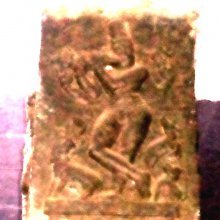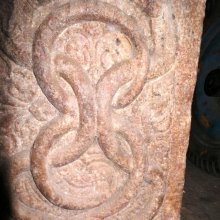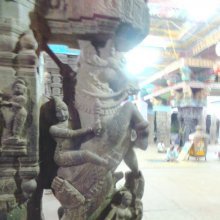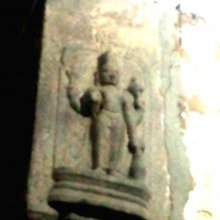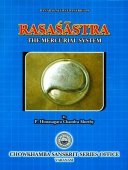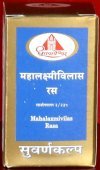Has: 9 definitions
Introduction:
Has means something in Hinduism, Sanskrit. If you want to know the exact meaning, history, etymology or English translation of this term then check out the descriptions on this page. Add your comment or reference to a book if you want to contribute to this summary article.
Images (photo gallery)
(+401 more images available)
Languages of India and abroad
Sanskrit dictionary
Source: DDSA: The practical Sanskrit-English dictionaryHas (हस्).—1 P. (hasati, hasita)
1) To smile, laugh (gently); हससि यदि किंचिदपि दन्तरुचिकौमुदी हरति दरतिमिरमतिघोरम् (hasasi yadi kiṃcidapi dantarucikaumudī harati daratimiramatighoram) Gītagovinda 1; Bhaṭṭikāvya 7.63;14.93.
2) To laugh at, mock, ridicule (with acc.); यमवाप्य विदर्भभूः प्रभुं हसति द्यामपि शक्रभर्तृकाम् (yamavāpya vidarbhabhūḥ prabhuṃ hasati dyāmapi śakrabhartṛkām) N.2.16.
3) (Hence) To surpass, excel, throw into the back-ground; यो जहासेव वासुदेवम् (yo jahāseva vāsudevam) K.; Śiśupālavadha 1.71.
4) To resemble; श्रिया हसद्भिः कमलानि सस्मितैः (śriyā hasadbhiḥ kamalāni sasmitaiḥ) Kirātārjunīya 8.44.
5) To jest, joke.
6) To open, bloom, blow; हसद्बन्धुजीवप्रसूनैः (hasadbandhujīvaprasūnaiḥ).
7) To brighten up, or to clear up; भास्वा- नुदेष्यति हसिष्यति चक्रवालम् (bhāsvā- nudeṣyati hasiṣyati cakravālam) Subhāṣ. -Caus. (hāsayati-te) To cause to smile; प्रमथमुखविकारैर्हासयामास गूढम् (pramathamukhavikārairhāsayāmāsa gūḍham) Kumārasambhava 7.95.
Source: Cologne Digital Sanskrit Dictionaries: Shabda-Sagara Sanskrit-English DictionaryHas (हस्).—[(e) hase] r. 1st cl. (hasati) 1. To smile. 2. To laugh at, to ridicule: (this root does not take the middle voice when it implies reciprocal action, as vyatihasanti they laugh at each other.) 3. To open, to blow. 4. To joke. 5. To resemble. 6. To brighten up. With apa, To deride. With pari, 1. To joke. 2. To laugh at. With pra, 1. To mock. 2. To laugh. With vi, 1. To smile. 2. To laugh at.
Source: Cologne Digital Sanskrit Dictionaries: Benfey Sanskrit-English DictionaryHas (हस्).—i. 1, [Parasmaipada.] 1. To laugh, [Daśakumāracarita] in
— With vyati vi-ati, [Parasmaipada.] To laugh at each other.
— With apa apa, To laugh at, [Rāmāyaṇa] 2, 35, 21. [Causal.] To ridicule, 1, 34, 17.
— With ava ava, 1. To laugh, [Pañcatantra] 191, 3; to smile, [Lassen, Anthologia Sanskritica.] 2. ed. 55, 74. 2. To laugh at, ridicule, Mahābhārata 3, 11181. avahāsya, Ridiculous, [Rāmāyaṇa] 4, 14, 31.
— With upa upa, To mock, [Mṛcchakaṭikā, (ed. Stenzler.)] 49, 10.
— With pra pra, 1. To laugh, [Pañcatantra] 216, 10; [Rāmāyaṇa] 1, 2, 23. 2. To mock, [Nala] 12, 117. prahasita, Laughing, cheerful, [Pañcatantra] 36, 2. n. Laughter, mirth. [Causal.] prahāsita, Caused to laugh, [Daśakumāracarita] in
— With saṃpra sam-pra, To laugh, Mahābhārata 1, 3431.
— With vi vi, 1. To laugh, [Vikramorvaśī, (ed. Bollensen.)] 12, 20; [Lassen, Anthologia Sanskritica.] 73, 9; [Pañcatantra] 74, 15 (vihasyamāna, perhaps corr. ºhasamāna, but also irreg.). 2. To smile, [Śākuntala, (ed. Böhtlingk.)] 17, 8. 3. To laugh at, Mahābhārata 1, 4762. vihasita, n. A gentle laugh.
— With saṃvi sam-vi, To laugh, [Mṛcchakaṭikā, (ed. Stenzler.)] 85, 14.
— Cf. probably [Latin] histrio; perhaps frequentative.
Source: Cologne Digital Sanskrit Dictionaries: Cappeller Sanskrit-English DictionaryHas (हस्).—1. interj. of laughter or mirth.
--- OR ---
Has (हस्).—2. hasati (te), [participle] hasita (q.v.) laugh, smile; laugh at ([instrumental] or [accusative]), mock, ridicule, cut out. [Causative] hāsayati make laugh; mock, ridicule.
--- OR ---
Hās (हास्).—hāsate go emulously; [Causative] hāsayati.
Source: Cologne Digital Sanskrit Dictionaries: Monier-Williams Sanskrit-English Dictionary1) Has (हस्):—1. has [class] 1. [Parasmaipada] ([Dhātupāṭha xvii, 72]) hasati (mc. also te; [perfect tense] jahāsa, jahase, [Mahābhārata] etc.; [Aorist] ahasīt [grammar]; [future] hasitā, [ib.]; hasiṣyati, [Mahābhārata] etc.; [infinitive mood] hasitum, [ib.]; [indeclinable participle] hasitvā, -hasya, [ib.]),
—to laugh, smile, laugh at ([instrumental case]), [ṢaḍvBr.; Gobhila-śrāddha-kalpa; Mahābhārata] etc.;
—to deride, mock, ridicule ([accusative]), [Mahābhārata; Rāmāyaṇa] etc.;
—to surpass, excel, [Kāvyādarśa];
—to expand, open (as a blossom), [Kuvalayānanda] :—[Passive voice] hasyate ([Aorist] ahāsi), to be laughed or smiled at, [Mahābhārata; Kāvya literature] etc.:—[Causal] hāsayati ([Aorist] ajīhasat), to cause to laugh, [Harivaṃśa; Kumāra-sambhava] :—[Desiderative] jihasiṣati (cf. √1. jakṣ) [grammar]:—[Intensive] jāhasyate (p. yamāna, [Mahābhārata]), jāhasti, to laugh continuously or immoderately, [ib.]
2) 2. has ind. an exclamation of laughter or loud merriment (also employed as a Nidhana in the Sāman).
Source: Cologne Digital Sanskrit Dictionaries: Yates Sanskrit-English DictionaryHas (हस्):—hasati 1. a. To laugh, to laugh at.
Source: DDSA: Paia-sadda-mahannavo; a comprehensive Prakrit Hindi dictionary (S)Has (हस्) in the Sanskrit language is related to the Prakrit words: Guṃja, Hasa.
[Sanskrit to German]
Sanskrit, also spelled संस्कृतम् (saṃskṛtam), is an ancient language of India commonly seen as the grandmother of the Indo-European language family (even English!). Closely allied with Prakrit and Pali, Sanskrit is more exhaustive in both grammar and terms and has the most extensive collection of literature in the world, greatly surpassing its sister-languages Greek and Latin.
Nepali dictionary
Source: unoes: Nepali-English DictionaryHas is another spelling for हस [hasa].—adv. Okay (polite affirmative);
Nepali is the primary language of the Nepalese people counting almost 20 million native speakers. The country of Nepal is situated in the Himalaya mountain range to the north of India.
See also (Relevant definitions)
Starts with (+885): Hacalkalam, Hahkara, Hahkartri, Hahkriti, Hasa, Hasa-parihasa, Hasa-phula, Hasabali, Hasabhuta, Hasabi, Hasada, Hasadana, Hasadanem, Hasadhamma, Hasadhirudha, Hasagala, Hasagara, Hasage, Hasagedisu, Hasagedu.
Ends with (+820): Abhash, Abhibhash, Abhikshnashas, Abhinabhas, Abhishas, Abhishnathas, Abhiyashas, Abhyanushas, Abhyardhas, Abhyushas, Acakshas, Achiraprabhas, Acirabhas, Aciraprabhas, Adattavachas, Adhas, Adhivakshas, Adhovarchas, Adhrishas, Adityayashas.
Full-text (+27158): Atthiya, Gunja, Desia, Samia, Pattia, Cakkiya, Joa, Parihasa, Jitendriya, Vea, Visha, Hasa, Dhejja, Prasutika, Avalea, Maluya, Abharana, Buddha, Mahasya, Mahasvada.
Relevant text
Search found 564 books and stories containing Has, Hās; (plurals include: Hases, Hāses). You can also click to the full overview containing English textual excerpts. Below are direct links for the most relevant articles:
Trishashti Shalaka Purusha Caritra (by Helen M. Johnson)
Part 5: Hanumat’s early career < [Chapter III - Hanumat’s birth and Varuṇa’s subjection]
Purity of alms < [Notes]
Appendix 1.3: The Fourteen Guṇasthānas < [Appendices]
The Agni Purana (by N. Gangadharan)
Chapter 46 - Characteristics of different Śālagrāma stones
Chapter 334 - Metres having similar characteristics in all the four quarters (samavṛtta)
Manusmriti with the Commentary of Medhatithi (by Ganganatha Jha)
Verse 7.99 < [Section IX - Art of Government]
Verse 5.58 < [Section VII - Impurity due to Death]
Verse 8.227 < [Section XXXVIII - Rescission of Sale]
Bhagavad-gita-rahasya (or Karma-yoga Shastra) (by Bhalchandra Sitaram Sukthankar)
General Rules Regarding The Translation
Appendix 2: The Gītā and the Upaniṣads
Chapter 12 - The State and the Activities of the Siddha (Perfect)
12th Imperishable, Compassion.
46th-50th Imperishable, The Five Abilities.
Vaisheshika-sutra with Commentary (by Nandalal Sinha)
Sūtra 3.1.12 (Marks of inference—continued) < [Chapter 1 - Of the Marks of Inference]
Sūtra 3.1.11 (Above continued) < [Chapter 1 - Of the Marks of Inference]
Sūtra 2.1.21 (The above are no marks) < [Chapter 1 - Of Earth, Waters, Fire, Air, and Ether]
Related products
(+271 more products available)

